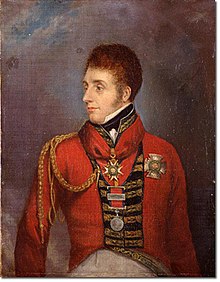William Ponsonby (British Army officer)
|
Sir William Ponsonby |
|
|---|---|

Portrait engraving published in 1817
|
|
| Member of Parliament for Londonderry |
|
|
In office 1812–1815 |
|
| Preceded by | Lord George Thomas Beresford |
| Succeeded by | George Robert Dawson |
| Personal details | |
| Born | 13 October 1775 |
| Died | 18 June 1815 (aged 39) Waterloo, Belgium |
| Cause of death | Killed in action |
| Nationality | British |
| Spouse(s) | Georgiana FitzRoy |
| Awards | Knight Commander of the Order of the Bath |
| Military service | |
| Allegiance |
|
| Service/branch |
|
| Years of service | 1811–1815 |
| Rank | Major-General |
| Battles/wars |
|
Major-General Sir William Ponsonby KCB (13 October 1772 – 18 June 1815), styled The Honourable from 1806, was an Irish politician and British Army officer who served in the Peninsula War and was killed at the Battle of Waterloo.
He was the second son of William Ponsonby, 1st Baron Ponsonby of Imokilly and Hon. Louisa Molesworth. Educated at Kilkenny and Eton, he married Hon. Georgiana FitzRoy, youngest daughter of Charles FitzRoy, 1st Baron Southampton. Between 1796 and 1798, Ponsonby sat as a Member of Parliament (MP) in the Irish House of Commons and represented Bandonbridge. Subsequently, he stood for Fethard (County Tipperary) and held this seat until the Act of Union in 1801. He entered the British House of Commons in 1812, sitting for Londonderry until his death. In 1815, he was appointed a Knight Commander of the Order of the Bath (KCB).
When Ponsonby's command, the 5th Dragoon Guards, arrived in the Peninsula in October 1811, it became part of John Le Marchant's heavy cavalry brigade. For the rest of the war, this brigade included the 5th Dragoon Guards and the 3rd and 4th Dragoons. Ponsonby took part in Le Marchant's famous charge at the Battle of Salamanca in July 1812. On that occasion, the British heavy dragoons rode down one French infantry division and part of a second before being repulsed. Upon Le Marchant's death in the battle, Ponsonby took over the brigade, participating in the campaign that included the Siege of Burgos. In 1813, Ponsonby led his 1,200-strong cavalry brigade at the Battle of Vitoria. During the Battle of the Pyrenees and the fall campaigns in the mountains, the Duke of Wellington sent the bulk of his cavalry to the rear. On 25 January 1814, Ponsonby took leave of his brigade and in the final battles in France, Lord Charles Manners exercised command.
...
Wikipedia
